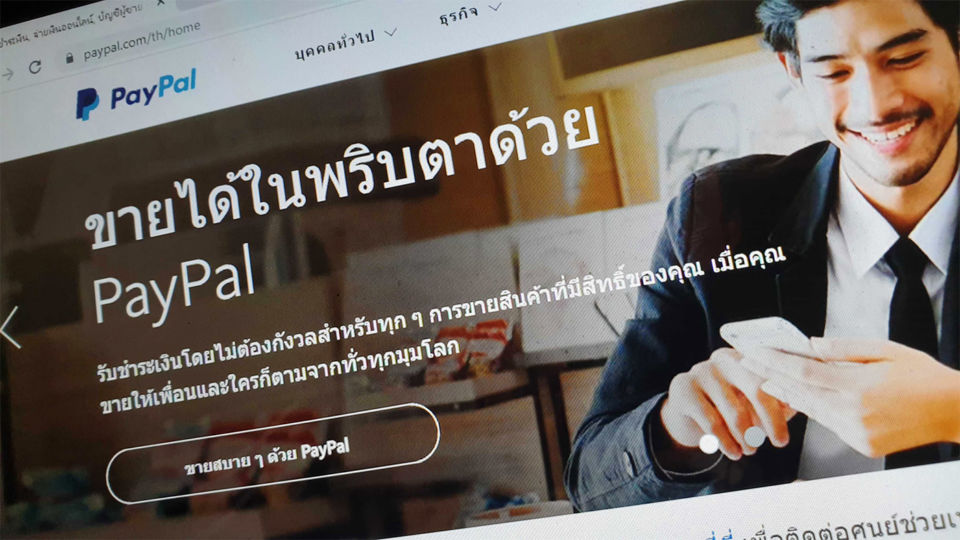In four months, PayPal will effectively be dead in Thailand for most users.
Under new terms announced last week, the company said any personal account created before March 2021 will be unable to receive payments or hold a balance after February.
The same rules apply for all business accounts not registered via the government’s new Know Your Business, or KYB, program, a scheme intended to increase transparency in finance and combat money laundering.
In essence, that means that one must have a KYB-registered business account in order to have a PayPal account at all. Personal PayPal accounts in Thailand will be dead as of March.
According to a PayPal customer service rep, Thailand is the only country in Asia with a PayPal presence to enact such rules.
Ed. note: After this story was published, PayPal spokesman Neil Cassley reached out with objections to its premise. “Most users will be able to continue using PayPal services once they complete a few simple steps to transfer their PayPal account to the new local platform or sign-up for new accounts,” the company said in a statement. “For example, consumers can continue to shop online, and registered businesses and registered sole proprietors can continue to receive payment. Some services won’t be brought back online immediately but they will gradually return later in the year.“
Is that all?
Of course not. All registered business accounts will be charged a 7% VAT on, according to PayPal, transaction fees, and domestic transactions can only be made in Thai baht. Also, no money can be transferred to U.S. bank accounts. So take that, freelancers.
People can still make payments using a registered business account linked to a Thai bank, however.
What does this mean for you?
Some have reported payments for Spotify and New York Times subscriptions routed through PayPal being denied. According to the PayPal rep, who was not authorized to speak to the media, this is simply a coincidence as the changes have yet to take effect.
In other words, all PayPal account holders in Thailand are still able to pay for services.
When the changes take effect, freelancers will be among those to feel the most pain.
Those who rely on PayPal to receive payment from foreign vendors will no longer be able to do so without a registered business account. Graphic designers, teachers, writers, and other online workers who work independently will almost certainly need to find new solutions.
So will anyone seeking to transfer cash to their home country.
That being said, those few with registered business accounts will still be able to send money from Thailand to friends and family overseas as “business transactions.”
But why, though?
The gist is that Thailand is overhauling its regulatory framework as it aims to accelerate its financial technology (fintech) industry and transition to a digital economy.
To cut through the bull: PayPal has to adhere to Thai law if it wants to do business here. Specifically: Thailand’s anti-money laundering and tax laws.
In order to operate in Thailand, PayPal is required to have an FX e-Money license and meet whatever standards that requires.
On the user end of the equation, the KYB verification is ostensibly part of a broader push by the Thai government to weed out money-laundering.
Among a litany of documents and personal information, it requires people to submit their 13-digit business identification number, proof of business address, and “identity information for the primary authorized user, each company shareholder with 25% or more ownership, and each additional executive or authorized user.”
That definitely means you’re in the system.
But it’s also about taxation. Sweet, sweet taxation. All those freelancers selling stuff on Etsy to make ends meet or supplement THB18,000 (US$550) monthly salaries? Time to pay up.
How are people reacting?
In a manner of speaking: not well. Many gig economy workers are unhappy, but most people are simply confused by the new regulations.
“I still have my U.S. [PayPal] account but I can’t link a Thai card to it, obviously. I need to figure something out because that’s how I send money to my family in the States. I need a beer,” said one Philippines national and long-term Bangkok resident, who wished to remain anonymous.
“The best thing we can do right now is pray for Etsy to support other payment channels for Thailand,” freelancer Thidhapa Chakunchorn wrote in the Etsy Thailand Facebook group.
In a report of a recent Clubhouse discussion, Johnstocker, a Thai podcaster and online tutorial provider, highlighted that the majority of business in Thailand is still cash-based, which makes it pretty much untaxable. The new rules, he said, really only hurt everyday people trying to hustle in Thailand’s anti-competitive marketplace.
Some have suggested turning to other solutions, such as sending money via Transferwise and receiving payment in Bitcoin. Conveniently enough, Thailand’s largest bank, SCB, recently bought a majority stake in crypto exchange Bitkub, which should streamline such transactions.
So… Thailand have just effectively blocked Paypal for normal users.
— Piriya ⚡🔑 ☣ (@piriya) November 9, 2021
Freelancers receiving money through Paypal will have it rough, but Bitcoin is always an option.
In other news: The largest bank in Thailand bought 51% shares of Thailand's largest cryptocurrency exchange.
Others suggested alternative digital payment providers, like Skrill or Ksher, or making international transactions via Thai banks like SCB or Kasikorn and increasing prices.
Long story short: if you need to send money overseas or get paid by clients based in Berlin or New York or whatever, it’s time to look for a new service provider.
Correction: An earlier version of this story indicated that the 7% VAT would be assessed on all transactions. PayPal has since said that it will only apply to its transaction fees.




